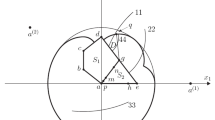Abstract
This paper is a continuation of the research [3], in which a formalization of nonantagonistic positional differential two-player games (NPDGs) was offered for the case of different behavioral types of players (in short, the NPDGwBT) as follows. In addition to the usual (normal, nor) type of behavior oriented towards maximization of his/her own functional, each player can use other behavioral types described in [2, 7], namely, the altruistic (alt), aggressive (agg), and paradoxical (par) ones. By assumption, each player can switch from one behavioral type to another in the course of the game. Note that in [6, 7] such switching allowed to obtain new solutions in a repeated bimatrix 2 × 2 game. The formalization of players’ actions in the NPDGwBT presented in [3] relies on the formalization and results of the general theory of antagonistic positional differential games [4, 5]. By assumption, in the NPDGwBT each player chooses a closed-loop strategy simultaneously with his/her own indicator function that is defined on the whole game duration and takes values from the set {nor, alt, agg, par}. The indicator function shows the behavioral type dynamics of a given player. The strong and weak BT-solutions of the NPDGwBT were defined in [3]. Expectedly, in some cases the abnormal types of behavior (the ones differing from the normal type) may yield better outcomes for players in the NPDGwBT than in the NPDG. The main emphasis of the examples in [3] was stressed on the use of altruistic behavior by all players. This paper considers two examples of games with simple 2D motion dynamics and phase constraints in which each player can demonstrate altruism and also aggression towards a partner for certain time intervals, including the case of mutual aggression. In the first example, strong BT-solutions are constructed in which both players increase their payoffs in comparison with the game with the normal type of behavior. If the players are prohibited to choose the aggressive type of behavior, then the game has no BT-solutions. In the second example, strong BT-solutions are also constructed but, under the prohibition of aggression, they still exist and are induced by the altruistic type of behavior.
Similar content being viewed by others
References
Kleimenov, A.F., Neantagonisticheskie pozitsionnye differentsial’nye igry (Non-Zero-Sum Positional Differential Games), Yekaterinburg: Nauka, 1993.
Kleimenov, A.F., Solutions in a Nonantagonistic Positional Differential Game, J. Appl. Math. Mech., 1997, vol. 61, no. 5, pp. 717–723.
Kleimenov, A.F., Altruistic Behavior in a Nonantagonistic Positional Differential Game, Autom. Remote Control, 2017, vol. 78, no. 4, pp. 762–769.
Krasovskii, N.N. and Subbotin, A.I., Pozitsionnye differentsial’nye igry (Positional Differential Games), Moscow: Nauka, 1974.
Krasovskii, N.N., Upravlenie dinamicheskoi sistemoi (Control of a Dynamic System), Moscow: Nauka, 1985.
Kleimenov, A.F., An Approach to Building Dynamics for Repeated Bimatrix 2 × 2 Games Involving Various Behavior Types, in Dynamic and Control, Leitman, G., Ed., London: Gordon and Breach, 1998, pp. 195–204.
Kleimenov, A.F. and Kryazhimskii, A.V., Normal Behavior, Altruism and Aggression in Cooperative Game Dynamics, Interim Report IR-98-076, Laxenburg: IIASA, 1998.
Author information
Authors and Affiliations
Corresponding author
Additional information
Russian Text © A.F. Kleimenov, 2016, published in Matematicheskaya Teoriya Igr i Ee Prilozheniya, 2016, No. 4, pp. 63–78.
Rights and permissions
About this article
Cite this article
Kleimenov, A.F. Aggressive Behavior in a Non-Antagonistic Positional Differential Game. Autom Remote Control 80, 171–179 (2019). https://doi.org/10.1134/S0005117919010156
Received:
Revised:
Accepted:
Published:
Issue Date:
DOI: https://doi.org/10.1134/S0005117919010156




